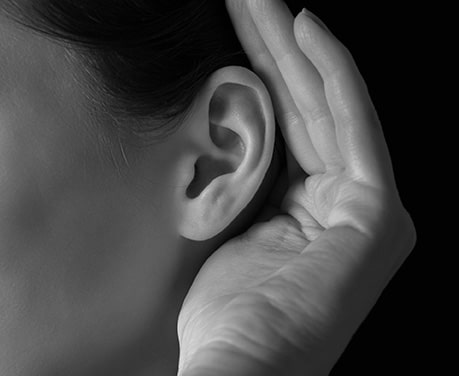Hearing loss may occur suddenly or progressively worsen over time. Symptoms may progress so gradually that you may be unaware of your hearing loss for some time. Even when hearing loss is suspected, it takes an average of seven years for a person to seek medical treatment.

How Is Hearing Loss Diagnosed?
In order to diagnose hearing loss, your doctor will review your medical history, discuss your symptoms, and give you a physical examination followed by a hearing evaluation consisting of a series of audiological tests.
What Are the Types of Hearing Loss?
Treatment of hearing loss depends on the type and degree of hearing loss.
Sensorineural hearing loss involves a problem with the inner ear, and is frequently referred to as “nerve deafness.” It may be caused by any of these:
- Aging
- Noise exposure
- Viral disease
- Medications
- Head trauma
- Autoimmune ear disease
- Meniere’s disease
- Malformation or abnormality of the inner ear
- Benign Tumors
If sensorineural hearing loss is sudden, oral prednisone or steroids injected across the eardrum may be recommended. Otherwise, as sensorineural hearing loss is gradual and most commonly associated with aging, wearing hearing aids is the most common treatment.
Conductive hearing loss occurs when there are problems in the outer ear, ear canal, eardrum or middle ear. It can be caused by any of the following:
- Ear infection
- Fluid in the ears
- Malformation or abnormalities of the outer or middle ear
- Impacted earwax
- Foreign object in the ear
- Allergies
- Perforated eardrum
- Otosclerosis
- Benign tumors
Depending on the underlying cause, conductive hearing loss may be treated by removal of ear wax, medications such as antibiotics or allergy medications, surgery to place a tube into the eardrum or stapedectomy in the case of otosclerosis, or hearing aids.
Mixed hearing loss is a combination of both types. Treatment might involve a combination of medication, surgery and/or hearing aids.
The extent to which someone is experiencing hearing loss is typically defined as mild, moderate, severe, profound or deaf. Hearing loss may affect one or both ears to different degrees. Those with unilateral (monaural) hearing loss have normal hearing in one ear and impaired hearing in the other; they have difficulty hearing on one side and localizing sound. Those with bilateral (binaural) hearing loss have impaired hearing in both ears.
Call Indiana Hearing Specialists at (765) 588-1231 for our Lafayette office for more information or to schedule an appointment.